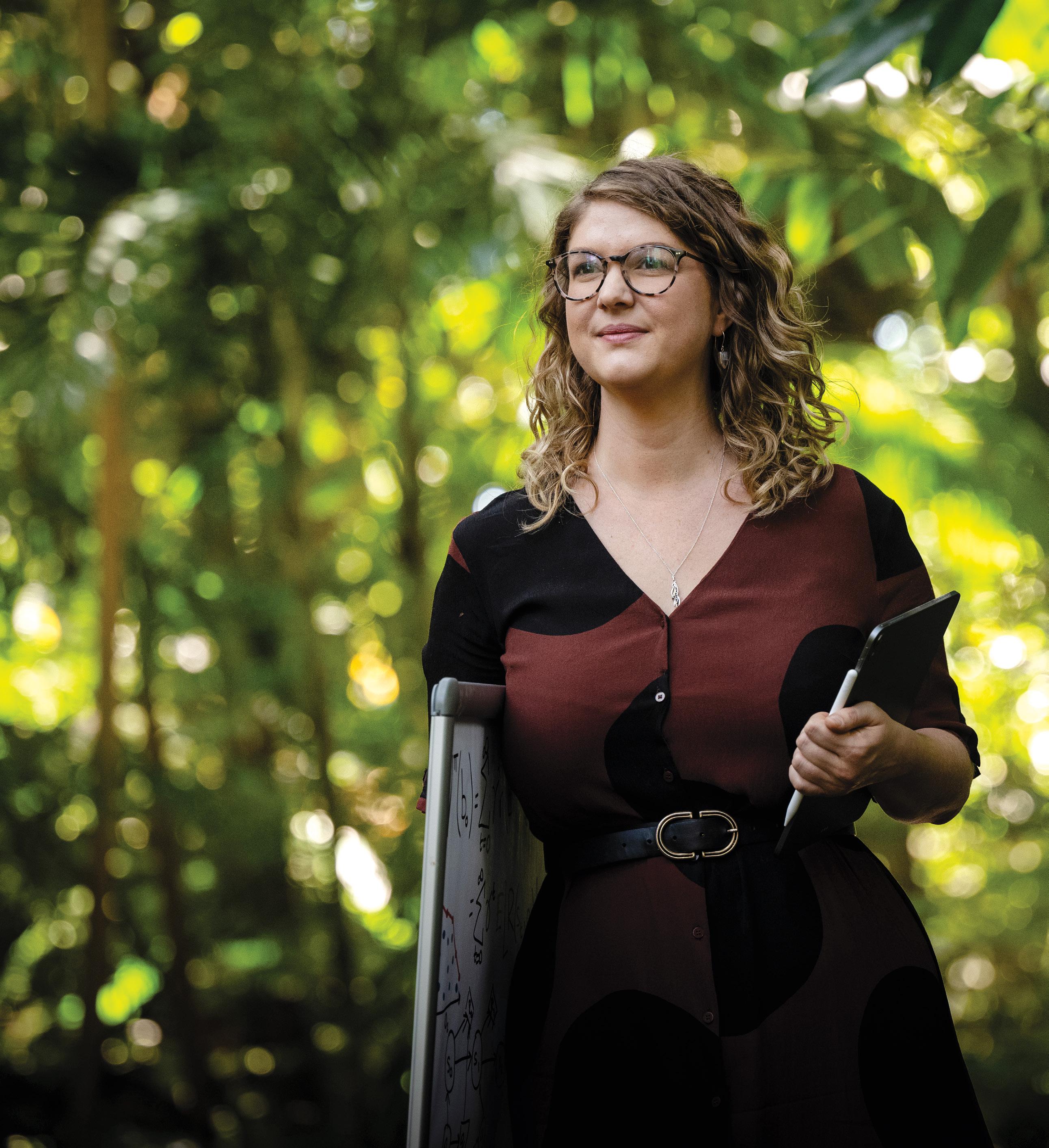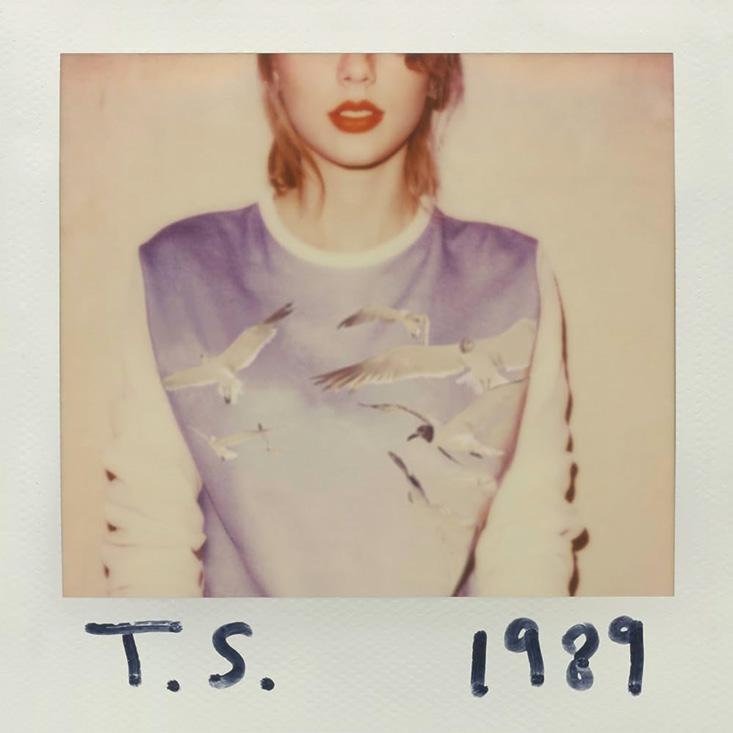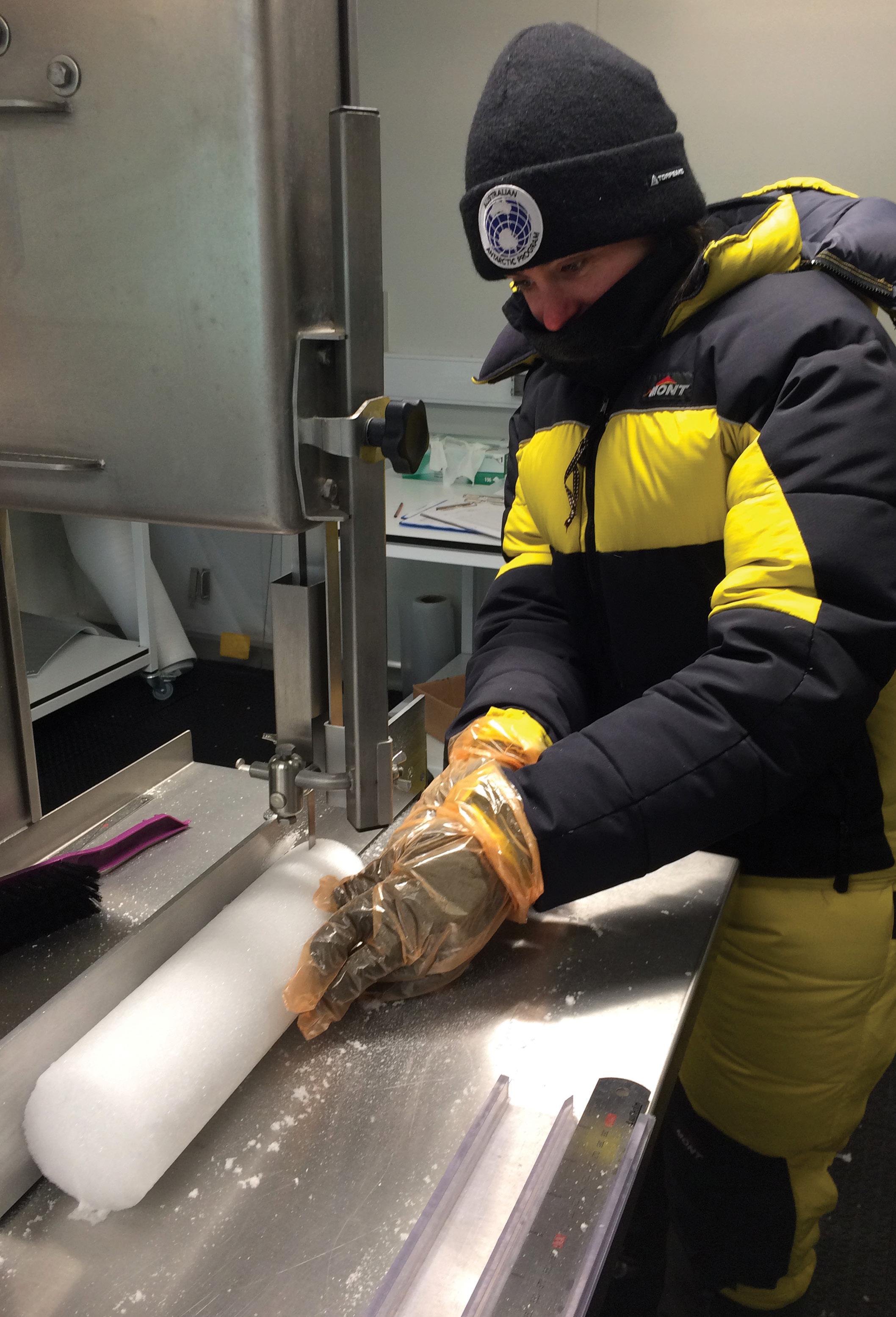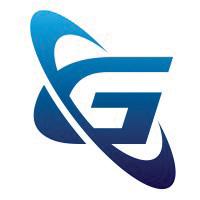CAREERS



Problem solver
Get maths ready Swiftywith formulas p6
World explorer
Meet our maths champ cover stars p10
Discover space + maths careers p18
Fast forward to a Master of Data Analytics
Meet soaring industry demands and graduate with a bachelor and master in four years. Combine data analytics with a bachelor in:
• information technology
• mathematics
• science.


 Dr Kate Helmstedt Associate Professor, QUT
Dr Kate Helmstedt Associate Professor, QUT
Our planet needs more people who are well-versed in maths
I’ve always loved the buzz you get from solving a problem. When I realised you can solve real-world problems with maths, it was the start of my career in mathematical ecology. Now, I get to use maths to help protect ecosystems that we all love, like the Great Barrier Reef and Antarctica.
Maths on its own is one thing, but you don’t have to be obsessed with maths to have a career using maths – you just have to see maths as a tool you might be able to use in the future one day.
The really exciting new opportunities for maths are going to lie in combinations such as maths and ecology, maths and health, maths and fashion, maths and chemistry, and maths and the fine arts.
People and companies are realising we’re living in a data-rich world, and they’re starting to think about how data can be used for good, which is something we can do by combining maths with statistics. And with the development of AI, we have an incredibly useful maths tool that can help us tease all sorts of

You don’t have to be obsessed with maths to have a career using it”
information and stories from an absolute tonne of data.
So my message to anyone in school is that if you have the tiniest inkling that maths might be for you – if you like the idea of being a data detective or the buzz of solving problems – then follow that thread and see where it takes you. You might become a mathematician, or you might just develop great maths skills and a knowledge of how they could help change the world.
Dr Kate Helmstedt Associate Professor, QUTUpfront
Having fun with maths
P6 You belong with me maths
Get some Taylor Swift maths in your life
P8 Learning to love maths
Tricks of the trade from a maths teacher

P10 Meet our maths champ cover stars
Cloris and Iris share their love of maths comps
P12 Will I ever need maths?
TLDR: Yes!


STEM + X =
Combine maths & data (STEM) with your passion (+ X) to discover your dream career
Maths & Data + …


P14 Climate & energy
Forecasting the future with maths

P16 Meet a climate data guru


Danielle works with Antarctic ice cores
P18 Space
Get set for a career growing (almost) at the speed of light
P20 Let’s do space!
School space programs to check out
P22 AI
Helping the world change for the better
P24 Money
Turn your interest in crypto into a career
p26 Education
Australia needs more maths teachers to help us thrive



The space industry is a growing area in both research and the development of space-related products. Many technologies initially developed for space exploration, such as GPS, water filtration and robotic surgery, are now widely used on Earth. Studying Macquarie University’s Bachelor of Science majoring in Astronomy and Astrophysics will launch your career in this booming field. Macquarie is home to the Australian Astronomical Optics (AAO-Macquarie), whose new thermal camera will explore new ways of capturing images as part of the payload of an Australian satellite launching in Queensland this year. AAO-Macquarie is also building a new optical multibeam laser collimator designed to travel to the moon and beyond to Mars to help explore previously unnavigated areas.
Taking maths, especially advanced maths, at the HSC level is the foundation of many careers within the space industry. Majoring in mathematics at university prepares you to pursue exciting, dynamic and cutting-edge fields in the 21st-century world of work and creativity by developing transferrable skills across broad areas including analytics, AI, astronomy, climate science, conservation, data science, e-commerce, IT, marketing, media and sustainability.
Learn more at mq.edu.au/study/find-a-course
It’s true! Maths can be exciting, surprising and a lot of fun!
Just ask Taylor Swift ...
Do you and maths have Bad Blood? Are you constantly asking, Is It Over Now? when you’re in the middle of a maths class or exam? Yep, maths can be tricky, but when you have that moment where it just clicks, you’ll feel like you’re Out Of The Woods and finally able to see the beauty in it. Getting to that a-ha moment is different for everyone. It could take an awesome teacher to explain a concept to you in a way that vibes with your learning style, or you might need
to see how maths relates to your interests and hobbies, or to everyday life and your future career. A funny video or meme could even convert you to being a maths Lover
Whatever it takes, just know that the ‘M’ in STEM never goes out of style. Maths is everywhere and will definitely be part of your dream job. To get you pumped for maths, check out these fun examples, courtesy of Taylor Swift. – Louise Meers

Did you know?
Cryptographers can work everywhere from banks to Taylor’s marketing team. The Allied forces even used them in World War II to crack the German Enigma code!

Some clever educators have been using Taylor to make maths more exciting. One maths professor turned a bunch of Taylor concert poses into maths functions, while other teachers are using songs like Cruel Summer and I Knew You Were Trouble to help primary schoolers learn multiplication.
Watch on TikTok:


Taylor uses all kinds of codes to drop deets on new releases. These often involve maths (and her lucky number, 13):
• Her latest album was released on 19 April, 2024. 19 + 4 + 2024 = 2047. 2 + 0 + 4 + 7 = 13
• In 2023, she announced the release date of 1989 (Taylor’s Version) on 9 August (8/9 in US date formatting). That date was 8 years, 9 months and 13 days since the original release of 1989, and it had been 13 weeks since she announced the release of Speak Now (Taylor’s Version) It was also 3208 days since the OG 1989 album was released and 3 + 2 + 0 + 8 = 13.



Taylor is surrounded by a team of maths pros!
Accountant
Crunches the numbers on Tay’s estimated US$1.1 billion net worth.
Cryptographer
Comes up with codes and clues about album releases.
Fashion designer Designs outfits for world tours and award shows.
Graphic designer Creates album covers, posters and merchandise.
Marketing analyst Makes data-informed decisions on everything from merch sales to countries to perform in.
Musician
Understands the patterns, symbols, ratios and fractions linked to music.
Photographer Nails angles, shutter speed and focal length to take photos.
Pilot Uses arithmetic, geometry and trigonometry to fly a private jet around the world.

Social media manager Creates posts according to engagement numbers.
Sound engineer
Uses arithmetic, trigonometry and algebra to produce music.
Web designer
Uses the rule of thirds and grids to create a website fans will love.


when they can do the maths, but it’s approachable because it’s in a real-life context.”
Before he’d finished Year 12, Harry was on a career path to the building industry, completing a Certificate II in Construction Pathways and then starting a carpentry apprenticeship.
With his trade experience, Harry then took what he’d learnt in the construction industry and transitioned to teaching high school maths and technologies, with a keen interest in vocational pathways.
“Numeracy and mathematics is in everything we do. From measuring with different equipment, to adding or subtracting to know if a material is big enough; mathematics is everywhere, and it is unavoidable,” Harry says.
“We work out ratios when mixing gas for welding, use equations to work out RPMs of machines, angles and geometry for milling machines. Students always seem a bit surprised
Harry says maths is more enjoyable when it feels relevant, as with any learning.
For students struggling with maths and considering dropping it, Harry says: “I try to remind my students of the value of being both a good problem-solver and someone who is up for a challenge.”
“Mathematics in high school teaches you more than just how to answer mathematics problems. It teaches students how to be effective problem-solvers, and equips them with a skill set to help them tackle any tricky situations,” Harry says.
“Of course, the way skills are applied to the problem is totally different, you’re not going to use algebra if your car is breaking down. However, you will utilise your mental skill set to determine how to approach the problem and what a good solution would look like,” he adds.
“There’s more to learn in mathematics than just mathematics!” —CharisPalmer

Cloris and Iris Xu love solving problems with maths and making new friends in the process
Cloris and Iris Xu are gold medallists in maths, and, just like regular Olympians, they travel around the world to compete with the best of the best!
What do you like about maths?
I guess I would categorise myself as a problemsolver. I like to solve problems – not just maths problems, but also problems in real life. At quite a young age I was really keen on just making the world a better place, and I think every problem in the world that we have right now can be somehow solved with maths. Even if the way of solving it is not clear, I think maths is the way to get close to the problem.
What’s it like competing internationally?
It’s definitely a really stressful experience! But also very rewarding. You face so many people that are actually complete strangers to you; many of them don’t even speak the same language. But while it’s scary in one sense, it’s also really exciting to be able to travel around the world and meet people my age who I share so much in common with because they also have the same interest in maths. The maths competitions are also the best thing to calm myself when I’m stressfully preparing for my exams!
What do you want to do when you finish school?
I definitely want to make use of my maths knowledge to make the world better. I don’t know the specific field I will be in, but I definitely see myself doing research in maths. I’ve been learning about topology and how it relates to health. People are always talking about human wellbeing but it’s such a grand term. For me, human wellbeing is a state where everyone is feeling physically and also mentally well, so I’m really intrigued by studying that with maths.
The Year 12 twins from Baulkham Hills High School in Sydney’s south west have represented Australia at the European Girls’ Mathematical Olympiad, competing with girls from more than 50 nations. In 2023, the Australian team ranked third out of 55 countries, with both Cloris and Iris receiving gold medals. In 2024 they will travel to Tskaltubo in Georgia to compete again. — Charis Palmer

Iris Xu Year 12 student
I like painting and drawing in my free time as it helps me to relax. I also like reading historical works and classic literature.
I’m
really keen on making the world a better place”
What do you like about maths?
I started out just having fun with maths, but when I discovered the fact that a lot of the fields in the world utilise maths, I realised it’s kind of limitless.
I saw the deep and rigorous thought process it involves and that it’s very helpful in a lot of processes, like science research.
it like internationally?competing
By communicating with more people that are also doing maths it kind of helps you to stay curious because all of the people have different
perspectives on maths. I also like the international travel and meeting new people. When you’re communicating with such a wide range of people, it is pretty hard to actually lose interest in maths!
What do you want to do when you finish school?
I’ve always thought about doing work in environmental preservation. I know I want to do something that involves working with people from other fields, probably biology, like monitoring wildlife or working out how we use resources in different environments. I’ve also been considering the advancement of human development in space and something related to how we utilise resources from other planets.
What do you do for fun outside of maths?
I’m quite different from Iris as a person outside of maths! One of my biggest hobbies is writing, and I’m also fascinated by the connection between art and science. They’re both very deep fields run by people with a passion for exploring the world.
I’m fascinated by the connection between art and science”

If Cloris and Iris have inspired you to get involved in maths competitions, there are plenty to consider! Ask your teacher or check out the list on the Australian Maths Trust website.
Australian Maths Trust CEO Nathan Ford says the European Girls’ Mathematical Olympiad program has been growing every year.
“Research shows the value and importance of diversity in problem solving. At the Trust, we are continuing to develop and explore opportunities to help young women develop their skills in maths and algorithmics. This is because women have a critical role to play in finding solutions to the challenges facing us as a society and in an increasingly innovative and technology-driven economy.” Maths comps to check out:

It can be easy to think that you need maths only to do your algebra or geometry homework or if you have a job as an engineer. But, in fact, maths pops up everywhere – even in the soap bubbles in your kitchen sink.
While washing dishes when I was 13, I noticed that the soap bubbles formed tiny 3D polygons, packed together like a honeycomb, but not all of these shapes were perfectly round. Why did some look like hexagons? Why were others shaped like squares full of air? Why didn’t I see any star-shaped bubbles, or bubbles with spikes?
When I learnt that maths could help answer these questions, I thought that was so cool!

Now, as a professor of mathematics who studies how people learn maths through play, I understand why bubbles are naturally lazy, and I even studied the maths behind the reason I saw only some shapes in soapy dishwater. Besides helping explain the behaviour of bubbles and other curiosities of nature, maths is likely part of many of your everyday activities, along with the technology you enjoy and even the inner workings of your brain. Doing maths isn’t just about computing, memorising, solving an equation or doing word problems by yourself. It’s really about creative problem-solving and logical thinking with other people.

Many topics you learn in primary school – like fractions, percentages and measurements – are useful in everyday life.
For example, if you want to build a fence, paint your walls or sew yourself a new outfit or quilt, all of those activities require knowledge about measurement and scaling. More complicated construction projects, such as building a treehouse, require lots of mathematical problem-solving skills. Once you’ve laid out the plans for one of these projects, you need to buy all the materials.
Percentages – which are special kinds of fractions – are especially important to understand when it comes to managing money. Understanding percentages can help you budget your money and increase your net worth
Beyond budgeting, you might find yourself using percentages when cooking a double batch of brownies, determining how much medicine to take when you’re sick or understanding the weather forecast
Maths is an essential tool that animators use to make movies.
Studios like Pixar rely on ideas from geometry to bring characters like Ember from Elemental to life. With an understanding of geometric transformations like reflections, rotations and translations, you can use your computer to make your own animations.

Coordinate systems, which are fundamental to geometry, show up in video games like Minecraft.
Many high-paying jobs use maths, especially probability. Understanding probability helps doctors identify how effective medical treatments are, helps coaches improve their team’s performance and aids cryptographers in keeping private information – like your email password or ATM PIN –secret. Cryptography combines probability with number theory to create secret codes

Maths can have a big impact on your internal life too. You can use maths activities to train your brain the same way you would train your body for a sport. Doing maths helps your brain become flexible so you can better handle new tasks and ideas of all kinds.


Even doing things that don’t look like maths, such as crossword puzzles, word searches and board games like Set and Blokus, are deeply mathematical activities that help your brain get stronger
Maths can even help you outsmart AI
With the rise of AI, it’s important to be able to think creatively, reason logically and make connections between concepts – whether mathematical or not. Puzzling through a difficult maths problem nurtures these skills, even if you don’t get the right answer right away.
It’s important to remember that doing maths doesn’t require you to get the correct answer immediately. In fact, you can learn a lot by getting the wrong answer. Working with others can help you really understand the problem, and you’ll build communication and teamwork skills
Maths is so much more than memorising times tables and filling out homework problem sets. So next time you kick back to watch your favourite animated movie, or start saving up for a fancy new tech gadget, hopefully you’ll appreciate how maths is woven into so many parts of life. – Hortensia Soto
Hortensia Soto is Professor of Mathematics at Colorado State University. This article first appeared on The Conversation.
If you’ve ever wondered how maths applies to the real world, look no further than the electrical socket your phone is plugged into.
Maths lies at the heart of forecasting energy use and weather events, both of which are key in making sure you have the power you need. Through mathematical modelling and data analysis, professionals in these sectors can anticipate energy demands, optimise the way power gets
allocated, and mitigate the impact of big storms or other weather-related events. Maths pros are also working out how climate change is affecting temperatures over time, and what that means for the amount of energy we use. Plus, they help forecast the changing climate’s impact on future insurance claims. No wonder they’re in such high demand! – Charis Palmer
Where is climate and energy forecasting used?
• Animal conservation
• Energy
• Farming
• Insurance
• Healthcare • Manufacturing
• Retail
• Technology
• Transportation





Before there were weather apps, people used to guess the temperature using a method that involves counting the number of times a cricket chirps!

Ever thought about using your number- crunching skills to power up the world? Well, energy analysts are the maths wizards who do just that! They’re like the superheroes of sustainability, forecasting how much energy we’ll use, finding sneaky ways to save energy and making sure we’re using energy in the smartest way possible.
Attention, future meteorologists! Have you ever dreamed of being the one who predicts when it’s going to rain or shine? Well, weather forecasters are the ultimate weather wizards who use maths and data analysis to do just that. Their forecasts help keep us safe and sound when Mother Nature decides to throw us a curveball.
Helpful skills
If you’re interested in becoming a climate or energy analyst, these are some useful skills:
✔ Attention to detail
✔ Problemsolving
✔ Curiosity and perseverance

✔ The ability to distil complex information into simple presentations
If you’ve got a knack for numbers and a passion for making the world a better place, then government policy analysis might be your calling. These maths maestros use their number-crunching skills to develop policies and regulations that promote energy efficiency, renewable energy and sustainability.environmental They’re fighting to save the planet, one policy at a time.
Imagine being the mastermind behind making sure your favourite snacks are always in stock. Supply chain analysts do just that! Armed with maths powers, they predict how much of a product we’ll need, when we’ll need it and how to get it there without a hitch.
MATHS&DATA + CLIMATE & ENERGY + STUDY
Bachelor of Data Science, QUT
Bachelor of Science (Geographical Science), The University of Queensland
Bachelor of Science
/ Bachelor of Mathematics, QUT
Bachelor of Mathematical Sciences, Macquarie University
Bachelor of Statistics, ANU
MATHS&DATA + CLIMATE & ENERGY + JOBS
Energy analyst
$60K–$110K
Weather forecaster
$70K–$120K
Government policy analyst
$65K–$120K
Supply chain analyst
$68K–$125K*
indeed.com

Danielle Udy works with Antarctic ice cores and climate models to help us better understand our changing climate
In high school, Danielle knew she wanted to work in weather or climate science and be outdoors. Now, her dream has become reality!
As an Antarctic climatologist, Danielle works with Antarctic ice cores in the -20°C freezer at the Institute for Marine and Antarctic Studies in Hobart.
“We are developing a new ice core climate proxy for extreme weather events in Antarctica to be able to see how the snowfall onto the ice sheet changed before satellite observations became available,” Danielle says.
Danielle’s work helps experts figure out the impact of climate change and climate variability on climatic events such as flood, drought, bushfire and sea-level rise.
When she’s not in the lab, Danielle spends her time at the computer writing code to analyse data, and reading and writing scientific papers.
I often wish I had done more foundational maths”
Danielle took geography, physics, maths B and physical education at school.
“I often wish I had done more foundational maths and coding courses in undergrad,” Danielle says.
If you’re interested in using maths to help save the planet, Danielle says climate science is the place to do it.
“In particular, climate change risk assessment is a growing area of career opportunities, and we need more graduates who can understand and communicate climate science.” –
Charis Palmer
Danielle got a very energetic puppy in the last six months of her PhD and says, while it was chaos, it helped ensure she still got outdoors in between serious writing.
 Dr Danielle Udy Antarctic climatologist
Senior catchment modeller, Alluvium Environmental consultant, BMT
Bachelor of Science (Geographical Science), The University of Queensland
Postdoctoral researcher, University of Tasmania
Dr Danielle Udy Antarctic climatologist
Senior catchment modeller, Alluvium Environmental consultant, BMT
Bachelor of Science (Geographical Science), The University of Queensland
Postdoctoral researcher, University of Tasmania
In her 9-5 at Energy Queensland, Emma Studerus dives deep into data to find valuable energy insights

Wanting a study and career path that would engage her mind and give her regular challenges to tackle, Emma started her STEM journey by enrolling in a Bachelor of Data Science at QUT.
At QUT, she loved the flexibility of online and on-campus courses, as well as the practical nature of the coursework and the opportunities available to students. “Through programs like VRES (Vacation Research Experience Scheme), I had the chance to engage in research and apply mathematical concepts to real-world problems early in my degree,” she says.
Now, Emma is a senior forecasting system analyst for Energy Queensland, where she sorts through large amounts of data to gain valuable insights. “For example, I might examine Queensland customers’ photovoltaic rooftop solar generations to understand generation outputs,” she explains.
To generate new ideas, she also researches how others have tackled similar problems. This usually involves creating machine learning
seize opportunities that spark interest, even if they seem unrelated”
models and training them to recognise patterns in the data. Emma then evaluates how well these models perform in real-world situations.
One of the coolest parts of her gig? All the problem-solving! “Every day, I encounter new puzzles to solve, whether it’s untangling complex data sets or devising innovative solutions to tricky problems,” she says.
Creativity is another important skill to have in STEM careers, according to Emma, who was once a make-up artist! “Being a make-up artist allowed me to express my artistic interests by creating unique looks and exploring different styles. This shaped my diverse skill set and interests beyond what might be expected from someone in my field.”
Her top piece of STEM career advice is not to fret over having a clear idea of where your career is heading. “Instead, I would emphasise the importance of seizing opportunities that spark interest, even if they seem unrelated or unconventional.”
– Louise Meers
Space careers are (almost) growing at the speed of light. And behind all the fun and varied gigs? The M in STEM!
FYI: the space industry is booming! With the Australian Space Agency aiming to triple the size of the sector and create up to 20,000 new space jobs by 2030, there’s never been a better time to launch your space career. If you’re keen on (moon)walking this path, you’ll need solid maths skills, so if you’re thinking about dropping it as a subject…don’t!
But what kind of maths will you need? If you want to be an astronomer, you’ll have to calculate mass to understand the size of planets and use trigonometry to measure the distance between planets, stars and even different galaxies.
What about if you want to be an astronaut?
You’ll want to get good at measurements to work out the effects of zero gravity on your height. Future astronauts (and aerospace
$150 million is how much the government has pledged to the Moon to Mars initiative. This is all about getting Australian companies and researchers involved in NASA’s plans to return to the Moon and then venture out to Mars.
$65.7 million is going to the Fast Tracking Access to Space initiative. The aim? To get Aussie tech into space sooner and make us a leading launch destination!
$12 billion is how much Australia aims to make in revenue from its space sector by 2030.
$7-10 billion is expected to be invested into Defence space capabilities by 2030.

engineers!) should also scrub up on calculus to calculate optimal rocket speed for launching into space. Aerospace engineers need to know how to calculate speed and velocity when designing vehicles too.
Data scientists are another important profession in the space industry and this job is all about the numbers. As a space data scientist, you’ll be tasked with collecting and analysing information from spacecraft, rovers, satellites and telescopes to gain insights into everything from space weather to spacecraft health.
Whatever direction your space career journey takes, you can’t go wrong with a solid foundation in maths. – Louise Meers





30,000 people could be working in the Australian space sector by 2030.
10 STEM + space activities to try on the weekend or in the school holidays. Prepare to be skilled up and inspired! Find them here: bit.ly/cws-activities
6 space careers that don’t involve leaving Earth: bit.ly/earth-careers
4 is the number of videos in this Careers with STEM playlist – they’ll get you excited for carving out your own role in space. Watch them here: bit.ly/space-career-videos

Hit up these Australian companies for your dream maths + space job!
• Gilmour Space Technologies
• Fleet Space Technologies
• Myriota
• CSIRO



• Quasar Satellite Technologies
• Exodus Space Systems


We’ve got starry eyes for their out-of-this-world careers!
Dr Helen Maynard-Casely, instrument scientist
Helen uses instruments like WOMBAT (a high-intensity powder diffractometer) to recreate the conditions on moons like Saturn’s Titan to try and find out how these geological features are formed.
Read Helen’s career profile: bit.ly/helen-mc
In his cool space gig, Brenan helps young people see the variety of careers in this sector, such as space medicine and space law.
Check out Brenan’s CV: bit.ly/brenan-dew
MATHS&DATA + SPACE + STUDY
Bachelor of Engineering (Electrical and Aerospace), QUT
Bachelor of Science (Astronomy and Astrophysics), Macquarie University
Bachelor of Science (Space science & Astrophysics), University of Adelaide
MATHS&DATA + SPACE + JOBS
Astrophysicist
$61K–$121K
Data scientist
$64K–$135K
Aerospace systems engineer
$66K–$92K

This free Careers with STEM job kit download is your introduction to careers in space and Defence. Inside, you’ll find deets on working in the industry, salary insights and advice from those already working in this field. Get your copy by scanning the QR code.

Avionics engineer
$49K–$125K
Program manager (aerospace)
$46K–$159K*
Check out these school space programs for your chance to get in on the ground floor
NASA’s Artemis program, with its aim to put the first woman and person of colour on the Moon, is inspiring STEM students everywhere.
And in case you were thinking you’d have to head overseas to pursue a space career, that’s not the case. The Australian Space Agency wants to create up to 20,000 jobs in our national space industry by 2030.
All these big space goals mean there are more and more school programs popping up for students keen on space – be it in our galaxy, or on the ground supporting new industries. Here are some for you to check out!
— Charis Palmer
Taking place during term breaks, students in years 7, 8 and 9 head to Houston in the US to take part in real-life astronaut training exercises and simulators, along with learning about space science.
Held alongside World Space Week, this program sees Australian students take part in a virtual space mission and learn from a former NASA astronaut. The organisers ask students in years 7 and 8 to pitch via video.
In this program, students complete a nine-step STEM design sprint based on challenges facing NASA’s Artemis and the Australian space industry. A number of teams are then selected to pitch their ideas at the Young Space Explorers event in December in Sydney!
As part of this program, students from Western Sydney schools develop an experiment, one of which will be further developed and launched to the International Space Station. Students at schools around Australia can develop their own analogue version of the experiment to follow along on Earth!
This program offers resources to teachers to help students engineer some of the tech used in low-cost cube satellites through Arduino, microcontrollers, sensors and coding.
Macquarie University graduates Blaise Kuo Tiong and Jahanzaib Zahoor are using their maths smarts to help Australia compete in the space race
In his already fun-filled career, Blaise has helped operate space missions, performed experiments under the ice in Antarctica and worked on mountain peaks in Hawaii. But he says his current job working with satellites is the first one where he’s been able to work on a big project from beginning to end.
“My part in the program is to build the software and systems we need to be able to communicate with the satellite and download the valuable data it collects,” Blaise says.
His university experience provided important foundational knowledge both inside and outside the classroom, he says. “I learnt just as much at my student job as a programmer as I did in the classroom and it exposed me for the first time to a career in space and science operations.”
Bachelor of Science (Mathematics/Applied Sciences), UCLA

Dr Blaise Kuo Tiong Space engineer
Blaise is only the second Filipinoborn person to spend the winter at the South Pole Station in Antarctica.
“I have met the first, he was an incredible gentleman who was sent down there as an electrician for the US Navy. He has an Antarctic mountain named after him: Ambadala Peak,” Blaise says.

Software Systems Engineer, NASA/JPL
System Administrator, Canada France Hawaii Telescope
Winterover Experiment Operator, US Antarctic Program, IceCube Collaboration
Master of UniversityEngineering, of Wisconsin-Madison PhD in MacquarieAstronomy,University
Senior Ground Test Infrastructure Engineer, Satellites, Gilmour Space Technologies

Jahanzaib Zahoor Mechanical engineer
Fun fact
Jahanzaib is learning to fly aeroplanes in his spare time!
Mechanical engineer
Havingloved design and technology, maths and physics at school, Jahanzaib always wanted to get into aeronautical engineering.
Now in his role as a mechanical engineer at Australian Astronomical Optics, Jahanzaib researches and prototypes things he could only dream about at school.
“All the work is related to the study of space and light which is in itself exciting,” Jahanzaib says. And he reckons the coolest part is designing instruments that will actually get launched into space.
“Every instrument is different and a one-off in the world,” Jahanzaib says.
He credits his STEM study for providing the grounding to be able to engineer solutions to real-world problems.
AI is a powerful tool for crunching huge amounts of data that humans might struggle to analyse. This opens up new opportunities to solve complex problems, be it changing the way healthcare is delivered, engineering new materials and structures, or exploring our universe and beyond, to name a few. With the winning combination of maths and AI skills, you could step into a career where creativity meets computation and the boundaries of possibility are redefined daily. – Charis Palmer

Top organisations at the forefront of innovation are actively seeking talent with expertise in maths, data and AI.
Atlassian is a leading Australian tech company offering diverse opportunities in AI, data science and software development.
CSIRO is Australia’s national science agency, pioneering research in AI, data analytics and sustainable technologies.

AI will be a game changer for humans, so why not be at the forefront?



Commonwealth Bank has many opportunities for you to explore AI and data science, as one of Australia’s largest financial institutions.
Data61 is a division of CSIRO focused on data science, AI and digital transformation, driving innovation across industries.
UTS will allow you to work with experts in AI and data science through research initiatives and industry partnerships.
Dive into the depths of data to extract valuable insights and drive strategic decision-making. Use advanced mathematical models and AI algorithms to uncover patterns, trends and correlations that guide businesses and industries forward.


Pioneer the future of AI by developing and deploying sophisticated machine learning algorithms. From natural language processing to computer vision, your expertise in maths and data skills will shape the intelligent systems of tomorrow.
Navigate the intricacies of finance and economics, leveraging mathematical models and statistical techniques to

Melissa Humphries uses her maths skills to help people make sense of our world
WhenMelissa mentioned that she was good at high school maths to an English lecturer at uni, it set her on a path to a career in statistics.
“I wanted something that was going to have an impact and a career where I could do fun and cool things and be creative,” Melissa says. “And I thought that maths was just formulaic, straightforward and boring,” she adds.
After a stint as a chef, Melissa decided to study psychology. Having picked up some first-year maths and statistics subjects, Melissa then discovered how many real-world things rely on maths, from satellites to making planes fly.
“I realised maths, and especially statistics, is actually really creative, really flexible, and has a lot of impact,” Melissa says. “So by the time I finished my undergrad, I was offered honours in psychology and honours in maths and I chose to go with maths instead,” she adds.
Melissa went on to do a PhD in maths and statistics and the projects she now works on are super cool!

“Some of the really complex stuff that I’m working on is trying to understand our immune system holistically. So not just looking at your blood work or pictures of your brain, but building one model that
maths, and especially statistics, is really creative”

tries to capture a human being,” Melissa says. “And that’s really challenging mathematically.”
One of Melissa’s students in her role as a lecturer at the University of Adelaide is building a recommender system for forensic science, using AI. It would help police to better work out which evidence to DNA test from a crime scene.
Melissa says maths and AI will be crucial to the big changes our world will need to make in the future.
“Can you use AI without understanding maths? Yes, you can. Can you be at the forefront of change? No, not without mathematics.”
Tackle complex optimisation problems across diverse domains, from logistics and supply chain management to healthcare and telecommunications. Employ mathematical modelling and computational techniques to streamline processes, reduce costs and enhance efficiency. Certificate III in Commercial Cookery, Drysdale
MATHS&DATA + AI + STUDY
Bachelor of Data Science, QUT
Bachelor of Information Technology (Data Science), Macquarie University
Bachelor of Artificial Intelligence, UTS
Bachelor of Data Science and Decisions, UNSW
Bachelor of Data Science, Western Sydney University
MATHS&DATA + AI + JOBS
Data scientist
$64K–$135K
Machine learning engineer
$80K–$160K
Quantitative analyst
$70K–$150K Operations research analyst
$80K–$160K
AI ethics consultant
$90K–$170K*

inform investment strategies, risk management and market forecasting.
*Salaries sourced from payscale.com and indeed.com
MATHS & DATA
Working with currencies is getting more interesting thanks to the world of crypto…
In the dynamic world of finance, where numbers reign supreme and data drives decisions, careers at the intersection of maths, data analysis and money management are totally bankable!
From pioneering the latest trends in cryptocurrency to navigating the complexities of futures and currency trading, graduates with money smarts are shaping the future of global financial markets.
New tech is also creating new currencies, leading to new careers working with money.
Cryptocurrency analyst
Dive into the world of digital assets, analysing blockchain data and market trends to inform investment strategies and risk management.
Futures trader
Navigate the fast-paced world of futures markets, utilising mathematical models and data analysis to forecast price movements and execute trades across commodities, indices and currencies.
Currency strategist
Explore the intricacies of global currency markets, employing mathematical models and AI algorithms to forecast exchange rate movements and develop hedging strategies for multinational corporations and financial institutions.

Did you know?
31% of Australian investors aged 18-24 had investments in cryptocurrency in 2023 (ASX).
Imagine a career where maths skills meet financial expertise, and where data analysis can help people and companies manage their money better.
Whether you’re analysing cryptocurrency trends, trading futures or developing new payment methods, the possibilities are as vast as the markets themselves. – Charis Palmer
Quantitative analyst
Harness the power of mathematical modelling and data analytics to develop proprietary trading strategies and quantitative investment models.
Financial data scientist
Leverage advanced statistical techniques and machine learning algorithms to extract actionable insights from financial data, driving innovation and competitive advantage in the financial services industry.

Quinn Papworth caught the crypto bug during COVID and is now on a path to a career working with blockchain

“Don’t just go to university for the classes and go home. The real value of a university education is the network you derive from it and the opportunities it can open up. Make the most of your uni life and get involved – it makes it much more enjoyable.”
Bachelor of Business (Finance and Blockchain Enabled Business), RMIT (ongoing)
As an intern at a cryptocurrency investment company, Quinn spends his time researching crypto assets and markets, something he used to do for fun when he was studying science at uni.
“I saved some money during the COVID pandemic, and then kind of discovered crypto and just fell in love with it,” Quinn says. “I made some money, then lost some money and after a few cycles of that I realised the tech behind it is really cool,” he adds.
Having taught himself about blockchain, which is the decentralised database that cryptocurrencies rely on, Quinn decided to switch from studying science to business and finance. His blockchainenabled business major includes more maths than his science degree, but Quinn says as long as you have a basic understanding of maths you can get by.
Quinn landed his internship at investment firm Apollo Crypto through LinkedIn. When he finishes his degree, he’d like to be an investment analyst, and hopes to become the founder of a blockchain project.
“There are just so many cool use cases for blockchain that haven’t been fully explored yet, or maybe not explored well,” Quinn says. He says while many people are negative about crypto, the underlying technology could revolutionise financial markets.
with Impact

This is money usually issued by a country’s central bank or government. In Australia, that means Australian dollars and cents.
A type of digital currency that can be controlled by a single entity or a network of users. Closed virtual currencies, like Fortnite V-Bucks or frequent flyer points, are limited to set communities and can’t be exchanged for other currencies. Open virtual

Intern, Apollo Crypto
Created and stored on the blockchain and secured using cryptography, this is a type of digital token. Examples include Bitcoin and Ethereum. Cryptocurrencies aren’t regulated by a central bank, and they also tend to fluctuate pretty wildly.
CBDCs are digital forms of the physical money issued by countries’ central banks, which fix their value equivalent to their fiat currency. CBDCs don’t need to be connected to a traditional bank account for use.

MATHS&DATA + MONEY + STUDY
Bachelor of Business (Blockchain Enabled Business), RMIT
Bachelor of Applied Finance, Macquarie University
Bachelor of Business (Finance), QUT
Bachelor of Finance, Economics and Statistics, ANU
Bachelor of Science (Financial Mathematics), Curtin University
MATHS&DATA + MONEY + JOBS
Cryptocurrency analyst
$70K–$150K
Futures trader
$80K–$160K
Currency strategist
$90K–$180K
Quantitative analyst
$80K–$160K
Financial data scientist
$90K–$170K*
*Salaries sourced from payscale.com and Indeed.com
Australia needs more maths teachers to ensure we thrive
Finishing school with basic maths skills is something many people take for granted, but without these skills we wouldn’t be able to handle many of the things we do every day, like managing our time or cooking a meal. And it’s maths teachers who can make all the difference! Do I have all the information I need to understand this? What don’t I know? What should I ask? How can I find the information I’m missing? What other factors should I consider?


These are all questions maths teachers encourage students to ask, and they’re questions you get used to asking when you learn maths.
While maths is a core subject in high school for most Australian students, there’s a critical shortage of maths teachers. To help address this, some schools and state governments provide incentives and bonuses.
So, if helping people and being in high demand are important to you, then a career as a maths teacher could be calling your name. – Charis Palmer
If you’re interested in teaching but also want to travel, you’re in luck! Maths teachers are in demand not just in Australia, but around the world. And some international schools will even provide free acommodation or pay you an allowance for somewhere to live.
Work with secondary school students at different levels of maths to inspire them in STEM.

Choose your own hours by working as a contractor, choosing clients from a wide range of backgrounds and making a real difference.
Work in the vocational education and training (VET) sector to teach students studying trades the numbers they need to succeed.
Take your maths skills to the next level and join a university, inspiring maths students keen to make the next maths breakthrough.
WhenZoe heard one of her siblings say,
“I hate biology,” she was so determined to change their mind she started tutoring them.
“That’s when I realised I didn’t actually mind teaching them and trying to get them excited about science,” Zoe says.
She followed up her Bachelor of Applied Science with a Master of Teaching and now teaches high school maths and science.
Zoe says teaching, like any job, can be challenging, but also really rewarding.
“You get those kids who come in and say, ‘I can’t do maths’, and then one day they will look at you and be like,
‘Oh my god, Miss, is the answer two?’ And you’re like, ‘Yes it is!’ And that feeling is just so good.”

you get those kids who say, ‘i can’t do maths’”
zoe land maths teacher

MATHS&DATA + EDUCATION + STUDY
Bachelor of Mathematics
Education, University of Wollongong
Bachelor of Education (Secondary) (Mathematics Education), Edith Cowan University
Bachelor of Mathematics / Bachelor of Education (Secondary), The University of Queensland
MATHS&DATA + EDUCATION + JOBS
Maths teacher (secondary school)
$63K–$104K
Maths tutor
$49K–$74K


This free Careers with STEM job kit download is your introduction to careers as a STEM educator. Inside, you’ll find deets on working in the industry, salary insights and advice from those already working in this field. Get your copy by scanning the QR code.

Maths lecturer (university)
$57K–$117K*
*Salaries
Easy as pi ways to sharpen your maths skills for your future STEM career
Subscribe to the following maths-tastic YouTube channels: @misterwootube – Eddie Woo’s 1.8 million subscribers love his fun approach to teaching maths. @tibees – In Toby Hendy’s TheJoyof Mathematicsseries, she explains logarithms, parabolas and imaginary numbers through art. @khanacademy – If something didn’t make sense in class, the Khan Academy has so many great explainer videos to help you out!

– Get insights from maths legends working in data science, climate, finance, AI and more, plus the best/worst maths jokes.
Want to find out more about specific STEM careers? Check out our growing stack of Careers with STEM job kits: our eight-page e-mags introducing individual STEM jobs. Head to CareerswithSTEM. com.au/job-kits
Get your #mathtok on by following these TikTokers: @mathswithmisschang – Gives followers brilliant advice on solving maths problems.
Head to CareerswithSTEM.com to find our full collection of maths profiles. Get inspo, ideas, tips and tricks from people already doing your dream job!

@iteachalgebra – Teaching algebra and geometry through hilarious videos. @justicethetutor – Awesome maths study tips and explainers on everything from square roots to linear equations.

Asli Yoruk Data scientist
Explores the power, beauty and quirks of maths and is presented by self-proclaimed maths geek and comedian, Adam Spencer.
This ABC podcast tells incredible stories about the unseen influence that numbers have on the way we think, feel and behave.
Download this free Careers with STEM job kit – it’s your complete introduction to careers in data science! Get your copy by scanning the QR code.

Careers with STEM: Maths & Data 2024 is a publication and trademark of Refraction Media. Copyright © 2024 Refraction Media, all rights reserved. No part of this publication may be reproduced in any manner or form without written permission. If you would like to reproduce anything from this magazine, email: info@refractionmedia. com.au.
We acknowledge the Traditional Owners of country throughout Australia and recognise their continuing connection to land, waters and culture. We pay our respects to their Elders past, present and emerging. This issue went to press on 23 April 2024.
Printed in Australia by IVE.
Cover image: Lauren Trompp
Produced and published by: Refraction Media
Co-founder, CEO & Publisher : Karen Taylor-Brown
Co-founder, CEO & Head of Content: Heather Catchpole
Managing Editor: Charis Palmer
Digital Content Strategist: Louise Meers
Sub Editor: Amelia Caddy
Art Director: Katherine Power
Writers: Alexander Liddington-Cox, Louise Meers, Charis Palmer
SUBSCRIBE AND ORDER COPIES: CareerswithSTEM.com /subscribe
EDITORIAL & ADVERTISING ENQUIRIES: Email: info@refractionmedia.com.au or +612 9188 5459
POSTAL ADDRESS: PO Box 154, Oyster Bay, NSW 2225, Australia
CareerswithSTEM.com ISSN 2209-1076

